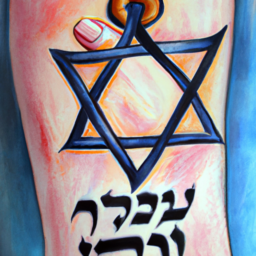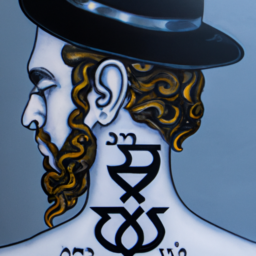“Understanding the Cultural Significance of Hebrew Tattoos”
The Cultural and Historical Significance of Hebrew Tattoos
In recent years, the trend of Hebrew tattoos has seen a remarkable surge in popularity. From celebrities to everyday individuals, the allure of this ancient script has captivated the hearts of many. However, it’s crucial to recognize that Hebrew tattoos are more than just a fashion statement; they carry deep cultural and historical significance that deserves respect and consideration. As we delve into the world of Hebrew tattoos, it’s imperative to approach this subject with the reverence it warrants, acknowledging the profound roots and the sacredness of the Hebrew language.
The Hebrew Language and Its Sacredness
The Hebrew language, with its ancient origins, is one of the oldest languages still in use today. It’s the language of the Jewish scriptures, including the Torah, which is considered the foundational text of Judaism. Hebrew is not merely a means of communication; it’s a vessel of a people’s history, spirituality, and identity. The intrinsic holiness attributed to Hebrew in Jewish tradition cannot be overstated. Each letter and word is steeped in religious significance, and the act of writing Hebrew is often regarded as a sacred practice.
This reverence for the language is evident in the meticulous care taken in the transcription of religious texts. The scribes who write Torah scrolls must adhere to strict guidelines, ensuring that each letter is crafted with precision and purity of intent. The Hebrew language is thus more than a collection of sounds and symbols; it is a conduit for divine wisdom and a sacred link to the past.
Given this profound respect for Hebrew, it’s understandable why the trend of Hebrew tattoos can be met with mixed reactions within the Jewish community. For some, the idea of permanently inscribing one’s body with Hebrew script can be seen as a beautiful tribute to their heritage or faith. For others, it may be perceived as a trivialization of something inherently holy.
Hebrew Tattoos and Jewish Law
The perspective of Jewish law on tattoos is complex and often misunderstood. Traditional Jewish law explicitly prohibits tattoos, as stated in Leviticus 19:28, “You shall not make gashes in your flesh for the dead, or incise any marks on yourselves.” This commandment has been interpreted by rabbinic authorities to forbid the act of tattooing, associating it with pagan practices and a desecration of the human body, which is considered to be created in the image of God.
Despite this prohibition, the trend of Hebrew tattoos persists, raising questions about cultural appropriation and respect for religious practices. It’s essential for individuals considering a Hebrew tattoo to engage in informed decision-making. This includes understanding the religious implications, the potential for offense within the Jewish community, and the broader ethical considerations of adopting elements from a culture or religion to which one may not belong.
The debate over cultural appropriation is particularly relevant in the context of Hebrew tattoos. When non-Jews choose Hebrew script for their tattoos, it can sometimes be seen as a form of exoticism, reducing a rich and complex tradition to mere aesthetics. It’s crucial for those outside the Jewish faith to consider the implications of their choices and to approach the Hebrew language with the same respect afforded to any sacred or culturally significant symbol.
For Jews and non-Jews alike, the decision to get a Hebrew tattoo should not be taken lightly. It’s a decision that should be made with a full understanding of the cultural and religious weight it carries. Engaging with members of the Jewish community, consulting with knowledgeable rabbis, and conducting thorough research are all steps that can help ensure that a Hebrew tattoo is approached with the sensitivity and respect it deserves.
In conclusion, Hebrew tattoos are a testament to the enduring beauty and significance of the Hebrew language. They can serve as powerful expressions of identity, faith, and connection to a rich cultural heritage. However, they also demand a level of responsibility and awareness that goes beyond the superficial appeal of body art. As we witness the growing trend of Hebrew tattoos, let us encourage a dialogue that promotes understanding, respect, and a genuine appreciation for the cultural and historical depth that these tattoos represent. Whether you are drawn to Hebrew tattoos for personal, spiritual, or aesthetic reasons, remember to research, reflect, and respect the profound legacy behind the ink you choose to carry on your skin.
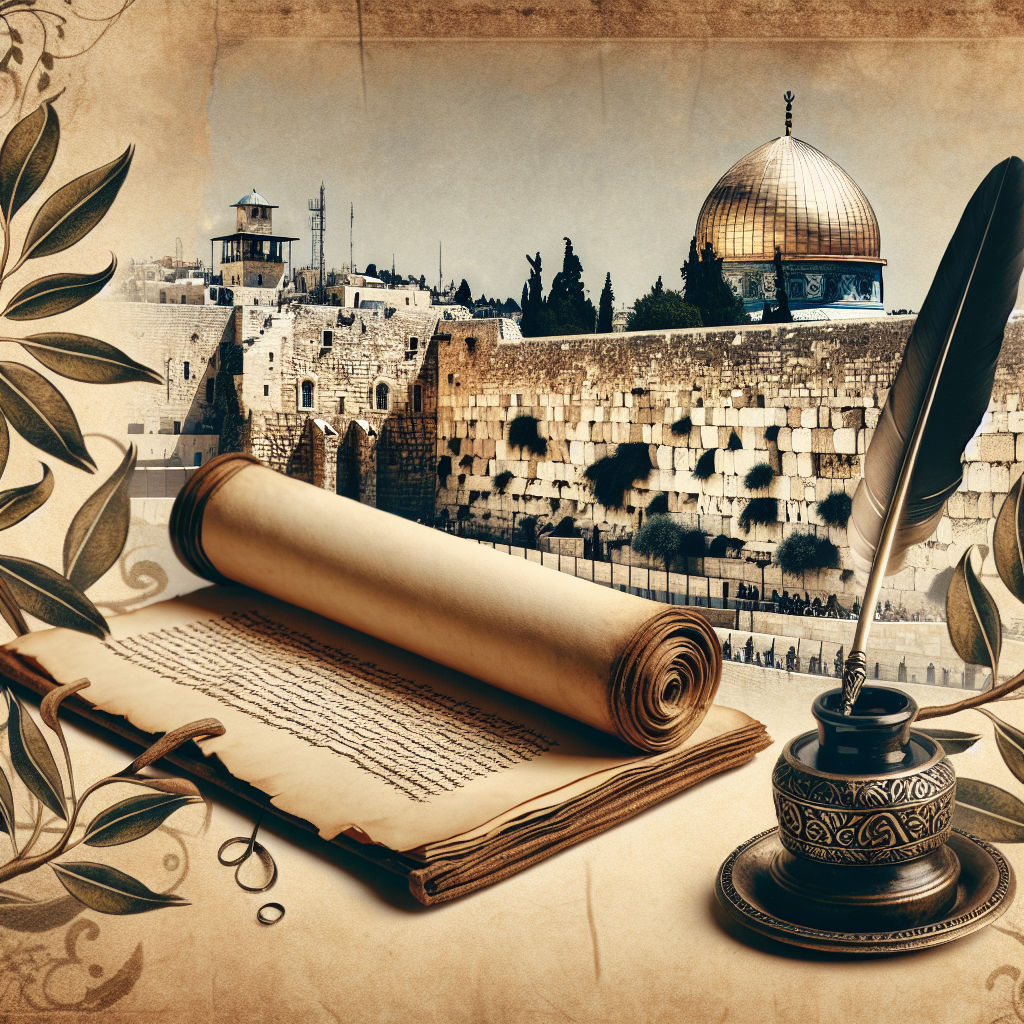
The Significance of Hebrew Phrases and Symbols
In the realm of body art, Hebrew tattoos stand out for their profound significance and the allure of the ancient script. The Hebrew language, with its storied past and spiritual resonance, offers a treasure trove of phrases and symbols that carry deep meanings. However, the journey from admiration to ink should be tread with caution, as the potential for misinterpretation looms large.
Common Hebrew words and phrases such as “אהבה” (ahava, meaning “love”), “חי” (chai, meaning “life”), and “שלום” (shalom, meaning “peace”) are popular choices for tattoos. They resonate with universal themes and personal aspirations. Yet, the deeper meanings behind these choices are often rooted in a cultural and religious context that extends beyond their literal translations. For instance, “חי” is not just a word; it’s a symbol of the Jewish people’s survival and perseverance throughout history.
The importance of accurate translation cannot be overstated. Hebrew is a language where a single misplaced dot or stroke can alter the meaning of a word entirely. This is why it’s crucial for individuals to seek guidance from native speakers or scholars who can ensure the integrity of the chosen phrase or symbol. A tattoo is permanent, and so is the potential embarrassment and disrespect that comes with a botched Hebrew script.
The Kabbalistic Influence
Kabbalah, the mystical branch of Judaism, has captivated the minds of seekers both within and outside the Jewish community. Its symbols and teachings, steeped in esoteric wisdom, offer an intriguing dimension to the world of tattoos. The allure of Kabbalistic elements in body art is undeniable, with symbols like the “Tree of Life” or the “72 Names of God” being particularly popular.
However, the Kabbalistic tradition is complex and sacred. Its symbols are not mere decorative motifs; they represent profound spiritual concepts and are believed to hold power. The “Tree of Life,” for instance, is a diagrammatic representation of the process through which the Divine creates the physical and metaphysical realms. Each sephira (node) on the tree embodies specific attributes of God and aspects of human experience.
Incorporating Kabbalistic symbols into tattoos without a deep understanding of their meanings can be seen as trivializing a rich spiritual heritage. It’s akin to plucking a verse from a poem without grasping its context or sentiment. Those drawn to Kabbalistic tattoos should immerse themselves in the study of these symbols or seek guidance from knowledgeable practitioners to honor the tradition they are tapping into.
Personal Identity and Hebrew Tattoos
Tattoos are deeply personal statements, often reflecting one’s identity, beliefs, or heritage. For many, a Hebrew tattoo is a way to connect with their Jewish roots or express their faith. It’s a mark of identity that can serve as a reminder of one’s history and values. For others, it’s a bridge between cultures, a way to embrace a tradition or philosophy that resonates with them, even if they are not part of the Jewish community.
The decision to get a Hebrew tattoo should be informed by an understanding of the cultural and historical context of the symbols and phrases chosen. It’s a gesture of respect towards the culture from which these elements are borrowed and a recognition of the weight they carry. When done thoughtfully, a Hebrew tattoo can be a beautiful testament to intercultural appreciation and personal growth.
In conclusion, Hebrew tattoos are more than mere adornments. They are imbued with history, spirituality, and cultural significance. Whether drawn from the language’s sacred texts, the mystical paths of Kabbalah, or the desire to connect with one’s heritage, these tattoos should be approached with reverence and responsibility. By doing so, enthusiasts can ensure that their ink not only beautifies the skin but also enriches the soul.
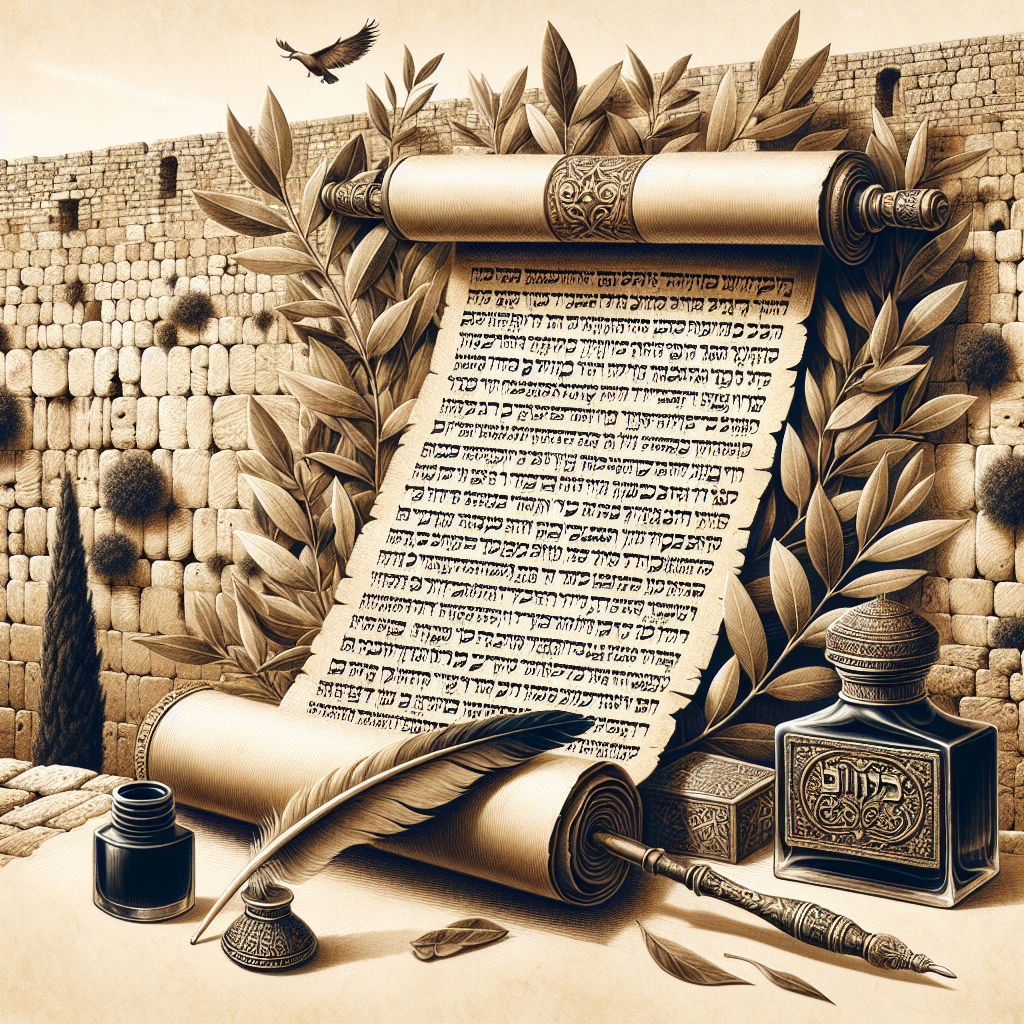
The Artistic and Aesthetic Appeal of Hebrew Tattoos
In the realm of body art, Hebrew tattoos stand out with their unique visual beauty and profound cultural resonance. The allure of Hebrew script in tattoo art is not merely a passing trend but a testament to the timeless elegance of this ancient language. The characters, with their distinctive strokes and lines, offer an aesthetic that is both exotic and meaningful, drawing individuals from various backgrounds to adorn their bodies with these symbols.
The versatility of Hebrew calligraphy in tattoo art is unparalleled. Each letter can be transformed into a work of art, with the potential to convey a multitude of emotions and messages. The fluidity of the script lends itself to various artistic interpretations, from the traditional to the contemporary, making it a versatile choice for those seeking a tattoo with both visual appeal and cultural depth.
However, the balance between aesthetic appeal and cultural respect is a delicate one. Hebrew tattoos are not just a fashion accessory; they carry the weight of thousands of years of history and tradition. It is crucial for individuals to approach these tattoos with a sense of reverence for the culture from which they originate. The Hebrew language is sacred to many, and its use in body art should be approached with sensitivity and understanding.
When considering a Hebrew tattoo, it is essential to delve beyond the surface beauty and explore the rich cultural heritage that accompanies it. This not only enriches the personal significance of the tattoo but also ensures that the wearer pays homage to the language and its people in a respectful manner.
Celebrities and the Popularization of Hebrew Tattoos
The influence of celebrity culture on the popularity of Hebrew tattoos cannot be overstated. High-profile figures from the entertainment and sports industries have been instrumental in bringing Hebrew body art into the mainstream. Celebrities such as David Beckham, Madonna, and Rihanna have all been spotted with Hebrew inscriptions on their skin, sparking interest and curiosity among their fans and the general public.
While the visibility of Hebrew tattoos on celebrities has undoubtedly contributed to their popularity, it also comes with a responsibility. These public figures have the power to shape perceptions and attitudes towards cultural symbols. As such, they must be mindful of the messages they convey when they choose to display Hebrew script on their bodies.
The impact of celebrities on public perceptions of Hebrew tattoos is a double-edged sword. On one hand, they can inspire a genuine appreciation for the beauty and significance of the Hebrew language. On the other, they risk trivializing a sacred tradition by treating it as a mere fashion statement. It is imperative for celebrities, and those who look up to them, to promote cultural sensitivity and awareness when it comes to body art that carries such profound historical and religious significance.
The Importance of Choosing a Knowledgeable Tattoo Artist
The decision to get a Hebrew tattoo should be accompanied by careful consideration of the artist’s expertise and cultural understanding. The risks of inaccurate or culturally insensitive tattoos are high, with the potential for misinterpretation, misspellings, and unintended offenses. A tattoo is a permanent mark, and errors in this context are not easily rectified.
Selecting a tattoo artist who is well-versed in Hebrew script and culture is paramount. Such an artist will not only ensure the accuracy of the tattoo but will also provide valuable insight into the cultural context and significance of the chosen design or phrase. They can guide the individual through the process, helping them to avoid common pitfalls and to select a tattoo that is both authentic and respectful.
The criteria for selecting an artist should include a proven track record of working with Hebrew script, a deep understanding of its cultural nuances, and a portfolio that demonstrates their skill and sensitivity to the language. It is worth investing time and resources to find an artist who meets these standards, as the end result will be a tattoo that honors the tradition it represents and the individual who wears it.
In conclusion, the cultural weight of Hebrew tattoos demands a thoughtful and informed approach. Whether drawn by the artistic beauty of the script, inspired by a celebrity, or seeking a connection to one’s heritage, it is essential to engage with these tattoos with the utmost respect. By doing so, individuals can ensure that their body art not only enhances their personal expression but also pays tribute to the rich cultural tapestry from which it originates. As the interest in Hebrew tattoos continues to grow, let us encourage a dialogue that emphasizes research, reflection, and respect for the cultural heritage behind each inked symbol.
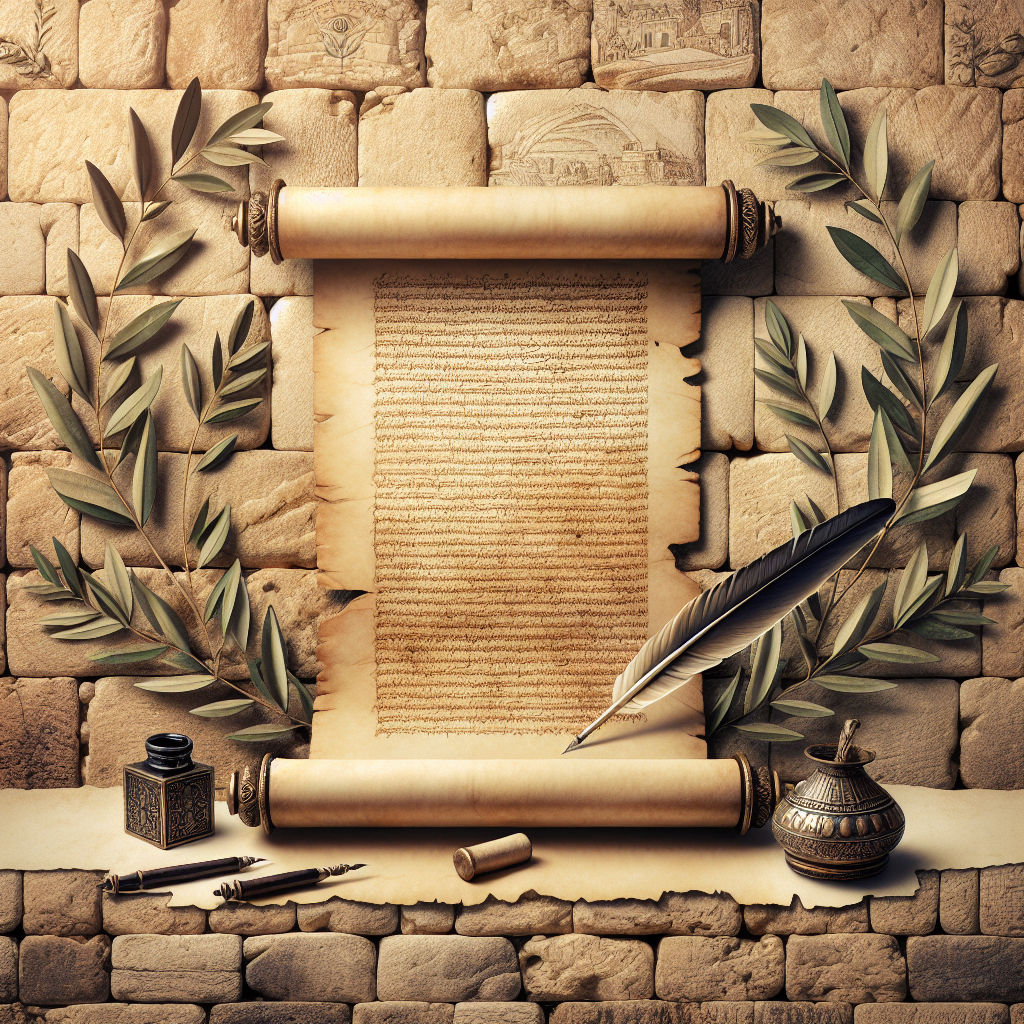
Choosing a Knowledgeable Tattoo Artist for Your Hebrew Ink
When it comes to adorning your body with a tattoo, the decision is as personal as it is permanent. This is especially true for tattoos that incorporate Hebrew script, a language steeped in ancient history and cultural significance. The allure of Hebrew tattoos lies not only in their visual beauty but also in the depth of meaning they carry. However, the process of getting a Hebrew tattoo requires more than just selecting a design; it necessitates finding a tattoo artist who is not only skilled with the needle but also deeply knowledgeable about Hebrew script and culture.
The risks of inaccurate or culturally insensitive tattoos are high. Hebrew, with its distinct characters and complex grammar, is a language that many tattoo artists may not be familiar with. A single misplaced dot or stroke can alter the meaning of a word or phrase, transforming what was meant to be a profound statement into a source of embarrassment or offense. Moreover, the cultural and religious weight of Hebrew script demands a level of respect and understanding that goes beyond aesthetics.
When searching for a tattoo artist, the criteria should extend beyond their portfolio of beautiful artwork. It is crucial to select someone who understands the nuances of the Hebrew language and can ensure the accuracy of the text. This may involve seeking out artists who specialize in Hebrew tattoos or those who have a proven track record of working with Semitic languages. A knowledgeable artist will be able to provide guidance on the choice of words, their proper spelling, and the cultural context behind them.
The value of investing in a well-researched and authentic tattoo experience cannot be overstated. A Hebrew tattoo is not merely a fashion statement; it is a piece of art that reflects your identity, beliefs, or connection to a rich cultural heritage. As such, it deserves the same level of consideration and expertise that one would apply to any significant life choice.
In the age of the internet, the responsibility of due diligence falls on the shoulders of the potential tattoo enthusiast. Researching artists, reading reviews, and viewing their previous work on Hebrew tattoos can provide insight into their proficiency with the language and script. It is also advisable to have a consultation with the artist to discuss your design and its meaning, ensuring that both parties have a clear understanding of the intended outcome.
Furthermore, a responsible artist will be open to discussing the cultural implications of your chosen design. They should be able to advise you on whether your tattoo might be seen as cultural appropriation or if it could potentially disrespect the traditions associated with the Hebrew language. This level of cultural sensitivity is a hallmark of a professional who values the significance behind their craft.
In conclusion, the journey to getting a Hebrew tattoo is one that should be embarked upon with reverence and responsibility. It is a process that involves more than selecting a design; it requires a partnership with a tattoo artist who is both artistically talented and culturally informed. By choosing an artist who understands the intricacies of Hebrew script and the cultural heritage it represents, you ensure that your tattoo is not only visually stunning but also a true and respectful reflection of its profound significance. Let your ink be a testament to your dedication to authenticity, a piece that you can wear with pride and confidence for a lifetime.
